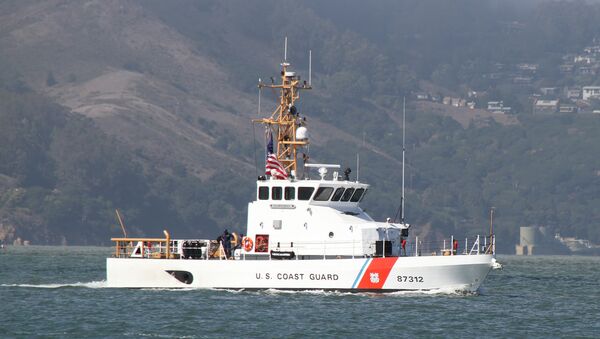In an effort to crack down on the drugs trafficking trade, the US Coast Guard is picking up increasing numbers of suspected smugglers far away from its shores, detaining them on ships for weeks or months at a time without a trial.
The number of detainees has increased significantly in recent years. According to the New York Times Magazine, in the 12 months to September 2017 the US Coast Guard captured more than 700 suspects and chained them up aboard American ships for weeks at a time.
The policy has been likened to that pursued in Guantanamo Bay, the controversial US military prison in Cuba where hundreds of prisoners at a time have been detained without trial. Despite a pledge by former US President Barack Obama to close the prison, as of January 19, 2017 there were 41 detainees there.
Guantanamo isn't the only U.S. prison shrouded in mystery — the Coast Guard has floating ones in the Pacific too. https://t.co/eqVQCcNaHL
— DelmarvaNow! (@MyDelmarvaNow) 29 ноября 2017 г.
Forget Guantanamo: This is almost as abhorrent as the secret prison on that island out in the Indian Ocean we leased from the UK to which #CIA "extraordinarily rendered" (kidnapped & trafficked) undeclared persons..#DiegoGarciahttps://t.co/iVoYNx9mtI @usatoday gets a citation
— Ryan Zbojovsky (@Zbojovsky) 29 ноября 2017 г.
In January 2012, the US Defense Department started a program called "Operation Martillo (Spanish: Operation Hammer)," focused on intercepting drugs traffickers as they leave ports in South and Central America.
The operation was launched by the US Southern Command, under the command of General John Kelly, the current White House chief of staff. Since the operation began, the number of maritime detentions has increased significantly, from around 200 per year to more than 2,700 over the past six years.
The amount of time suspects spend chained aboard US ships before they are brought ashore for trial has also increased. A former Coast Guard lawyer referred to the US vessels as "floating Guantanamos."
The average detention time is 18 days and some men have been held for up to 90 days. US Coast Guard officials and federal prosecutors justify the detention by arguing that suspects are not formally under arrest when the Coast Guard detains them.
Commentators have criticized the policy as "US imperialism," which "appears to egregiously violate human rights."
The drug war is an assertion of US imperialism. https://t.co/FLc8XrpWih
— Jonathan Cohn (@JonathanCohn) 26 ноября 2017 г.
.@SethFW documents a practice that appears to egregiously violate human rights: shackling trafficking suspects on US Coast Guard boats for weeks or months without trial. It intensified with Southcom's "Operation Martillo."https://t.co/gRIp6tnMi7
— Adam Isacson (@adam_wola) 21 ноября 2017 г.
However, others had little sympathy for these who are caught at sea, apparently smuggling drugs.
.smuggling cocaine is not a “job.” Millions of people are “struggling economically” and don’t turn to trafficking cocaine #crime pic.twitter.com/3KuzgTzKGZ
— Raphaeleads (@Raphaeleads) 28 ноября 2017 г.
The author of the New York Times Magazine article, Seth Freed Wessler, told PBS Newshour that there is little evidence the detentions are having an impact on the flow of drugs into the US.
"We can't really draw a line between what the US Coast Guard is doing and drug use in the United States. Cocaine use in particular. We're really talking about cocaine that goes up and down even as the number of people being detained each year in recent years has been going up and up and up," he said.
When they eventually come ashore, these men are charged in US courts and if convicted, serve their sentence in US prisons, which currently house more than 2.4 million inmates. Two Ecuadorian men who Wessler spoke to were sentenced to 10 and 11 years in federal prison.



